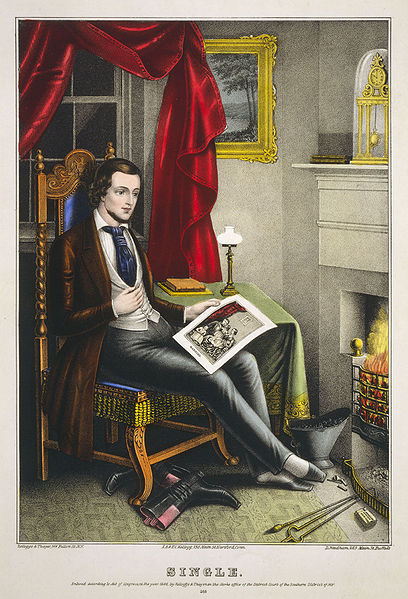Andrew Sullivan writes here about the plight of a pair of gentleman who’ve been asked to step out of the communion line at their Catholic parish on account of their recent same-sex civil union. Sullivan’s observations are about typical for those who are mystified over the Church’s reaction on this topic. I’d like therefore to review some of the myths concerning Catholic teaching on same-sex attraction and Church participation, because the reality is both more extreme and not nearly as extreme as people guess, and that paradox is what bites.
1. Yes. Marriage is about sex.
Even when you’re not having sex, marriage is about sex. Even when you are incapable of conceiving, marriage is about sex. It’s about sex because sex is about children, and children need to be raised by their mother and father. Marriage is so fundamentally about sex that failure to have sex (ever) is grounds for annulment, and the inability to have sex is an impediment to marriage.
We could say, very loosely speaking and with some exceptions that affirm the rule: Without the sex part (ever), you aren’t married, you’re just very good friends.
By “sex” what we mean is the real thing, not the cheap imitations. It’s the intimate act between man and wife that is the means by which new human beings with eternal souls are brought into this world. Even when no baby results, the act retains its sacredness and its deeper meaning. Think of intercourse like a love letter to the universe.
2. The trouble with Catholics is that we don’t hate people who experience same-sex attraction.
To make it even worse, we charitably assume the best about others.
This is, as in the Montana case, a recipe for disaster. Here are two wonderful men, kind, loving, active in their parish. Barring some public announcement that they’re committing mortal sins in their free time, there was no reason prior to their civil union for anyone to assume they were anything other than the picture of chastity.
There’s no moral law against friendship. There’s no moral law against a pair of bachelors rooming together. Indeed there’s a longstanding and noble tradition of unmarried or widowed siblings and close friends providing support and companionship for one another in old age. This is good.
(Since we who are reading about this case from afar can’t know otherwise, we’ll assume that indeed these gentlemen were conducting themselves in a way that cast no doubt on their chastity.)
Attempting marriage with a person of the same sex, however, is a public proclamation of at least one thing: I reject the Church’s teaching on sex and marriage. We pass therefore from the realm of private doubt and struggle into the land of open rebellion.
It is for this reason that a pastor might legitimately bar from communion a person who enters into a same-sex civil union, until the situation is rectified. To receive communion is to publicly proclaim one’s fidelity to the Church’s teachings.
3. But there’s all those other sinners!
Confounding matters is a widespread failure of the Church to teach the fullness of the faith. I can recall some time ago a young catechist coming to me, troubled: Her two fellow catechists were openly discussing (among adults, not in class) their choices of contraception. These teachers of the Catholic faith felt no need whatsoever to conceal their utter disregard for the teaching of that faith.
I could multiply the examples. The reality is that dissent on the Church’s teachings — not just her moral teachings, but concerning virtually any topic at all — is widely considered to be perfectly acceptable within parish life. The reason the young catechist felt conflicted is because she knew it was inherently problematic for someone to be teaching a faith they made no pretense of practicing, but she also knew that she’d likely be pegged as the over-pious tattletale if she discussed the matter with her pastor. She had no reason to believe anyone at her parish cared whether the catechists believed and practiced the faith they taught.
Within in this context, men and women experiencing same-sex attraction understandably wonder, “Why am I being singled out for the special treatment?”
Why, indeed, can’t I go about openly disregarding the faith the way everyone else does?
4. A house divided against itself cannot stand.
Thus we find ourselves, as Sullivan observes, at a splitting point. American culture has finally gone and done something that doesn’t sweep under the rug so well. Like the dysfunctional family that covers over the addict’s misdeeds, we in the Catholic Church have long been making excuses for our utter lack of discipleship. We want our faith and our unbelief, too. Pious on the outside, plain vanilla American on the inside, that’s our recipe and it’s “worked” for years.
Well, it hasn’t worked. We aren’t falling apart because the difficulties of a couple of gentlemen in a small town in Montana are too much for the Church to bear. We’re falling apart because we’ve long since ceased to be Catholic.
To answer the question Sullivan poses: The Catholic Church will endure. The million things people mistake for the Catholic Church?
Ephemeral.

Image courtesy of Wikimedia [Public Domain]












